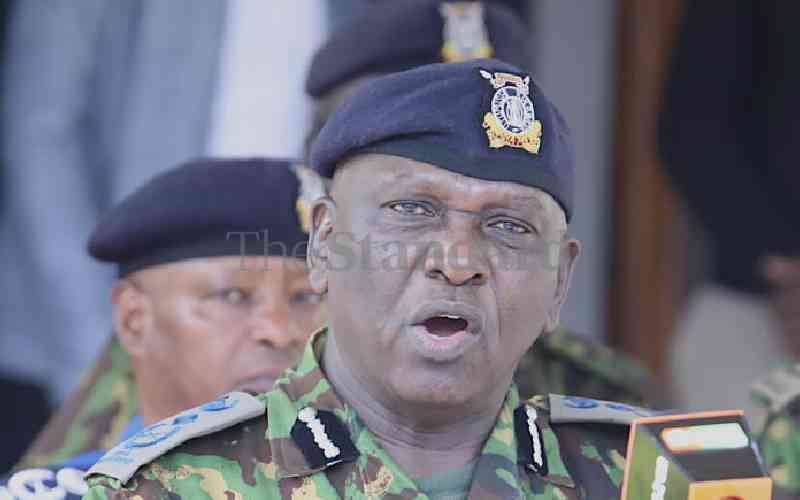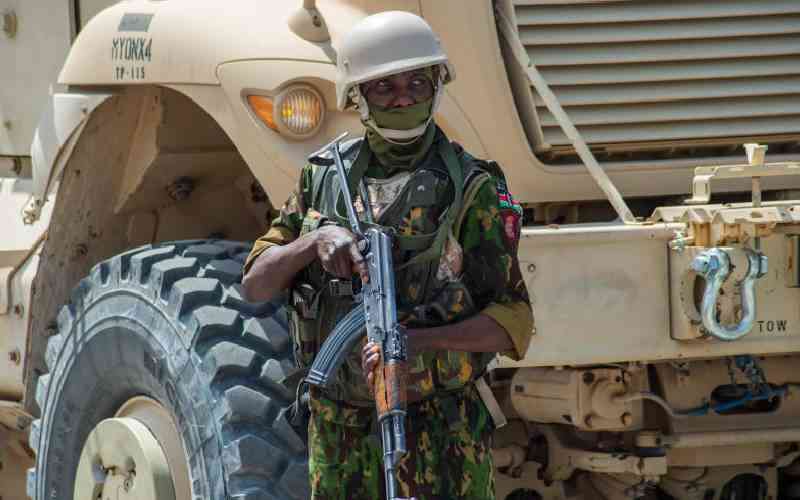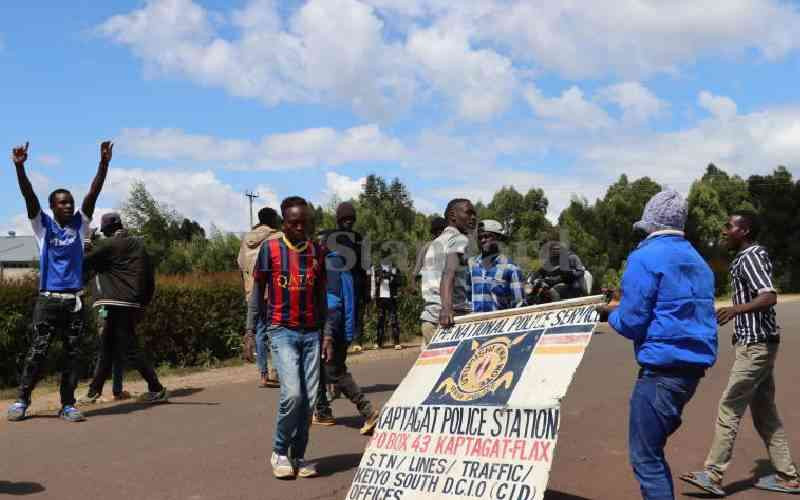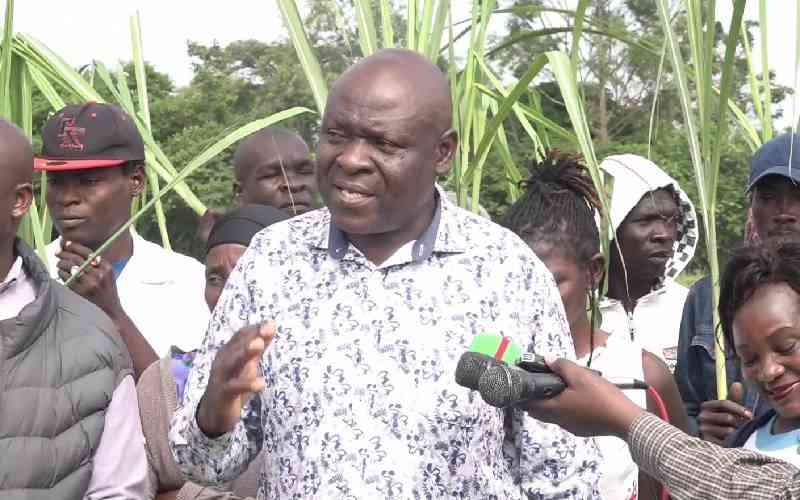By JOE KIARIE
The police are on the spotlight over reckless use of firearms once more as the State prepares to charge one of their officers with the killing of another.
The crisis comes at a time when the Police Service is struggling with a worrying rise in attacks on police officers and abuse of firearms by rank and file officers.
Just five days ago, a mob in Marakwet East beat a “drunk” administration police officer to death after he shot and injured a high school student.
And in the last month alone, at least three police officers have been shot dead by colleagues.
Inspector General of Police David Kimaiyo directed his officers to use their firearms when their lives, or those of others, are threatened. He, however, had to later caution against abuse in the light of the killings of police officers.
Tacit approval
There are also fears the tacit approval of a shoot-to-kill approach might trigger a wave of extrajudicial killings, as was the case in 2006 during a controversial effort to crush the Mungiki criminal gang.
The creation of a 30-member internal affairs unit, however, is seen as the first practical attempt to get to the bottom of the challenge. The team’s task will be to look into possible offences involving police officers, including gun crimes.
One of the incidents requiring investigation is the shooting of Police Constable Martin Kinyua, some two weeks ago by officers attached to Boya Police Station in Ahero, Kisumu County.
The officers were allegedly responding to reports by some night guards about a ‘suspicious’ car parked at a petrol station. Without waking the sleeping occupants, the officers sprayed the car with bullets killing PC Kinyua, who was in the backseat, and injuring another policeman, who was in the driver’s seat.
It later emerged the two policemen in the suspicious car were heavily drunk and were merely taking a rest at the petrol station.
The killing, which the police casually dismissed as a case of mistaken identity, was the fifth incident involving cops firing at their colleagues in three weeks.
Had the men involved been civilians, human rights activists say, the second man would have been murdered and the incident reported as a confrontation with criminals. But the involvement of policemen has helped reveal a fundamental flaw in police procedures that has probably led to numerous murders.
Human rights activists contend that many police officers are getting away with murder after recklessly using their weapons. They fear Kimaiyo’s apparent approval of lethal force might be interpreted as a licence to kill.
Stay informed. Subscribe to our newsletter
Usalama Reforms Forum CEO Mr Phillip Onguje says the law on the use of firearms poses a great dilemma as the police have at times engaged in extra judicial killings under the guise of self-defence.
“We have a Constitution that calls for the police to be a 21st century institution,” he states. “But actions on the ground indicate we are one century behind.”
Restoring social order, he says, cannot be addressed by just giving police powers to use firearms more freely. And in a force where shootings are not investigated thoroughly to determine whether they are justified or not, abuse is inevitable.
Mr Peter Kiama, executive director of the Independent Medico-Legal Unit, says that while the law gives the police powers to use lethal force when lives are in danger, this power has to be exercised sparingly. “The fact that police are to use their own judgment… makes it very tricky,” he says. “I believe the inspector general understands that he will be responsible when police use lethal force and that he is to investigate every single case.”
Unprecedented rate
Kiama also says it is unacceptable that members of the public are subjecting police to attacks at an unprecedented rate.
“This has to stop. It is the lowest level we can sink to as a society,” he states. But he argues this trend will not end via an order to open fire in self-defence. “Police have to earn the respect of the public through their conduct, not by using guns.”
Centre for Law and Research International executive director Morris Odhiambo argues that by insisting on the use of firearms, the police are trying to solve a complex problem using a rather simplistic approach.
Mr Odhiambo opines that the problem has never been the use of less force when police are cornered, but instead the abuse of their power to use firearms.
“Even when the police have the capacity to incapacitate a criminal by shooting him in the leg, you will find a body riddled with 20 bullets,” asserts Odhiambo. “This ends up in an extra-judicial killing. We don’t need police officers that are instruments of extra judicial killings or puppets to do dirty work for politicians.”
The cases of officers shooting their colleagues, he says, complicate the situation. Administration Police spokesman Masood Mwinyi defends the IGP’s directive, saying he did not issue a shoot-to-kill order.
“Police have powers vested on them to use minimum or maximum force,” he explains. “The officers are trained on the extent of the power to use… They can use the guns to subdue criminals or those who attack them.”
However, the abnormally high death rate associated with Kenya Police shootings suggests that few officers exercise restraint when shooting at ‘criminals’.
(More than 80 per cent of targets on the human body are non-fatal and most gunshot wounds are survivable. However, few people survive shootings in Kenya unless they are injured accidentally.) An unspoken policy of killing armed gangsters has even led to incidents where weapons are planted on unarmed people to justify their murder after the fact. Mwinyi takes a defensive stance on “gun battles”.
“When someone is carrying a gun held illegally, you might not know his intentions. When a gun battle ensues, it is also unpredictable.
“But when criminals surrender, they can be arrested with no use of maximum force,” he states.
He says each officer fully understands the consequences of using their weapons illegally or without justification. On killings within the force, the spokesman says police leadership has frequently advocated safe handling of firearms and officers identifying each other while on duty.
He says nothing justifies the recent attacks on police officers by the members of the public, insisting the force will not sit back and watch as its authority and that of the government is undermined.
“Attacking police officers does not augur well. It paints a very negative image of our country,” he states.
 The Standard Group Plc is a
multi-media organization with investments in media platforms spanning newspaper
print operations, television, radio broadcasting, digital and online services. The
Standard Group is recognized as a leading multi-media house in Kenya with a key
influence in matters of national and international interest.
The Standard Group Plc is a
multi-media organization with investments in media platforms spanning newspaper
print operations, television, radio broadcasting, digital and online services. The
Standard Group is recognized as a leading multi-media house in Kenya with a key
influence in matters of national and international interest.
 The Standard Group Plc is a
multi-media organization with investments in media platforms spanning newspaper
print operations, television, radio broadcasting, digital and online services. The
Standard Group is recognized as a leading multi-media house in Kenya with a key
influence in matters of national and international interest.
The Standard Group Plc is a
multi-media organization with investments in media platforms spanning newspaper
print operations, television, radio broadcasting, digital and online services. The
Standard Group is recognized as a leading multi-media house in Kenya with a key
influence in matters of national and international interest.








